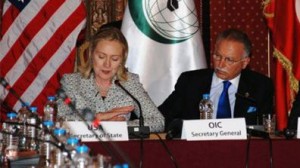 At
a State Department three-day, closed-door meeting in December 2011 with
representatives of the Saudi Arabia-based Organization of Islamic
Cooperation (OIC) on measures to fight religious "intolerance, negative
stereotyping and stigmatization," Secretary of State Hillary Clinton
protrayed the conference as a sign that Washington and the OIC are
working together to protect religious freedom around the world.
At
a State Department three-day, closed-door meeting in December 2011 with
representatives of the Saudi Arabia-based Organization of Islamic
Cooperation (OIC) on measures to fight religious "intolerance, negative
stereotyping and stigmatization," Secretary of State Hillary Clinton
protrayed the conference as a sign that Washington and the OIC are
working together to protect religious freedom around the world.
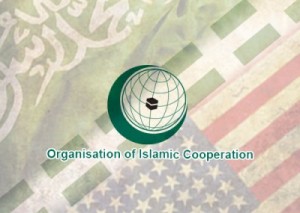 IPT (H/T TJV)
"We have to get past the idea that we can suppress religious
minorities, that we can restrict speech, that we are smart enough that
we can substitute our judgment for God's and determine who is or is not
blaspheming," Clinton said. "I think if we do our work right, in years
to come, people will look back and say this was a great step forward on
behalf of both (sic) freedom of religion, freedom of expression, and our
common humanity."
IPT (H/T TJV)
"We have to get past the idea that we can suppress religious
minorities, that we can restrict speech, that we are smart enough that
we can substitute our judgment for God's and determine who is or is not
blaspheming," Clinton said. "I think if we do our work right, in years
to come, people will look back and say this was a great step forward on
behalf of both (sic) freedom of religion, freedom of expression, and our
common humanity."
But according to the Hudson institute's Nina Shea (who attended portions of the conference as an observer), the event was actually a step backward for religious liberty. The meeting seemed to be an exercise in "moral equivalency and pandering to Sunni tyrants in the Middle East," she said.
"The
general theme seemed to be that the U.S. has problems just like Saudi
Arabia with religious tolerance," she added. "There was a total absence
of perspective on all counts."
Pointing to familiar
events such the Muhammad cartoon violence, Quran burnings and Muslim
objections to the film "Fitna," OIC Secretary-General Ekmeleddin
Ihsanoglu argued that his organization regarded bigotry as a primarily
Western phenomenon. He wrote that "no one has the right to insult
another person for their beliefs or to incite hatred and prejudice," and
that "freedom of expression has to be exercised with responsibility."
Zamir
Akram, Pakistan's permanent representative of the OIC before the U.N.
Human Rights Council was more emphatic. He claimed that Resolution
16/18, which expressed concern about "negative profiling" and religious "stereotyping," was driven by Western discrimination against Muslims. Akram
also questioned whether Muslims engaged in discrimination, and said
Muslims would not compromise on permitting "anything against the Quran,
anything against the Prophet."
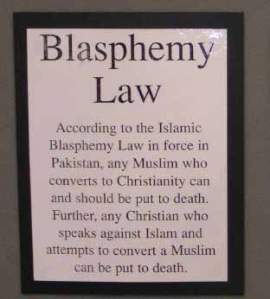 Given these comments – and Saudi educational materials that
encourage the spread of Islam through jihad and demonize Jews,
Christians and polytheists – Shea believes U.S. officials are "naïve" to
think there will be reciprocity from the OIC when it comes to combating
discrimination.
Given these comments – and Saudi educational materials that
encourage the spread of Islam through jihad and demonize Jews,
Christians and polytheists – Shea believes U.S. officials are "naïve" to
think there will be reciprocity from the OIC when it comes to combating
discrimination.
Despite
Saudi Arabia's abysmal record of persecuting non-Muslims, the Kingdom
received a note of dubious praise from the United Nations General
Assembly, which on Monday passed a resolution condemning
religious intolerance. According to Shea, the UNGA resolution – passed
by consensus with U.S. support – singled out for praise a single
program: A Saudi-built "religious dialogue" center in Vienna, Austria.
 OIC
member states spearheading the anti-blasphemy campaign include Egypt,
Pakistan and Saudi Arabia – all of which jail or execute "blasphemers."
In nations like Egypt and Iraq, Christians are attacked and their churches torched while Muslim-dominated governments are unwilling or unable to protect them.
OIC
member states spearheading the anti-blasphemy campaign include Egypt,
Pakistan and Saudi Arabia – all of which jail or execute "blasphemers."
In nations like Egypt and Iraq, Christians are attacked and their churches torched while Muslim-dominated governments are unwilling or unable to protect them.
"In these countries, you have 'cleansing' tolerated by the authorities," Shea noted. "Religious
cleansing [of Christians] is underway right now in Egypt and Iraq. It's
been completed in Saudi Arabia. Jews have been cleansed from the Sunni
Muslim world."
Shea
emphasizes that the behavior of OIC participants like Saudi Arabia
gives no indication that they are interested in dialogue with minorities
in their countries. She said that at the conference, participants
largely ignored the vast differences between the United States and OIC
member nations in protecting religious minorities.
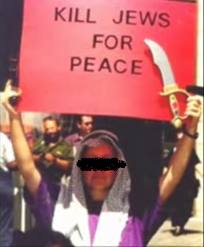 One legal official (State Department confidentiality rules barred observers from identifying him or his country) gave a "one-sided
depiction of American bigotry against religious minorities, including
Muslims" in his opening keynote address, Shea said, telling
representatives of some of the world's most repressive regimes that
America can learn from them about protecting religious tolerance.
One legal official (State Department confidentiality rules barred observers from identifying him or his country) gave a "one-sided
depiction of American bigotry against religious minorities, including
Muslims" in his opening keynote address, Shea said, telling
representatives of some of the world's most repressive regimes that
America can learn from them about protecting religious tolerance.
Pointing to mounting reports of atrocities and intimidation against Middle East Christians and mass slaughter by
the Islamist regime in Khartoum, Shea didn't mince words in
characterizing the attitudes of the American conference participants
toward their OIC counterparts.
"It's
the equivalent of saying to Hitler: 'Well, you have a real problem with
the way you treat minorities and we have a problem with limiting the
rights of Aryans here.'"
Washington Retreats on Speech Codes
The OIC (previously called the Organization of the Islamic Conference) has pushed for a universal blasphemy law for more than a decade. Since the November 2004murder of filmmaker Theo Van Gogh in the Netherlands and the 2006 riots protesting cartoon depictions of the prophet Mohammad, the group has pressured Western European nations to implement speech codes punishing criticism of Islam.


At a State Department three-day, closed-door meeting in December 2011 with representatives of the Saudi Arabia-based Organization of Islamic Cooperation (OIC) on measures to fight religious "intolerance, negative stereotyping and stigmatization," Secretary of State Hillary Clinton protrayed the conference as a sign that Washington and the OIC are working together to protect religious freedom around the world.
IPT (H/T TJV) "We have to get past the idea that we can suppress religious minorities, that we can restrict speech, that we are smart enough that we can substitute our judgment for God's and determine who is or is not blaspheming," Clinton said. "I think if we do our work right, in years to come, people will look back and say this was a great step forward on behalf of both (sic) freedom of religion, freedom of expression, and our common humanity."
But according to the Hudson institute's Nina Shea (who attended portions of the conference as an observer), the event was actually a step backward for religious liberty. The meeting seemed to be an exercise in "moral equivalency and pandering to Sunni tyrants in the Middle East," she said."The general theme seemed to be that the U.S. has problems just like Saudi Arabia with religious tolerance," she added. "There was a total absence of perspective on all counts."Pointing to familiar events such the Muhammad cartoon violence, Quran burnings and Muslim objections to the film "Fitna," OIC Secretary-General Ekmeleddin Ihsanoglu argued that his organization regarded bigotry as a primarily Western phenomenon. He wrote that "no one has the right to insult another person for their beliefs or to incite hatred and prejudice," and that "freedom of expression has to be exercised with responsibility."Given these comments – and Saudi educational materials that encourage the spread of Islam through jihad and demonize Jews, Christians and polytheists – Shea believes U.S. officials are "naïve" to think there will be reciprocity from the OIC when it comes to combating discrimination.
Despite Saudi Arabia's abysmal record of persecuting non-Muslims, the Kingdom received a note of dubious praise from the United Nations General Assembly, which on Monday passed a resolution condemning religious intolerance. According to Shea, the UNGA resolution – passed by consensus with U.S. support – singled out for praise a single program: A Saudi-built "religious dialogue" center in Vienna, Austria.Given Saudi Arabia's relentless persecution of non-Muslims, the praise is "Orwellian," Shea told the IPT. "They don't dare establish such a program on their own territory."OIC member states spearheading the anti-blasphemy campaign include Egypt, Pakistan and Saudi Arabia – all of which jail or execute "blasphemers." In nations like Egypt and Iraq, Christians are attacked and their churches torched while Muslim-dominated governments are unwilling or unable to protect them.
"In these countries, you have 'cleansing' tolerated by the authorities," Shea noted. "Religious cleansing [of Christians] is underway right now in Egypt and Iraq. It's been completed in Saudi Arabia. Jews have been cleansed from the Sunni Muslim world."By any measure, Muslims and other religious minorities in the United States face no dangers comparable to religious minorities in the Muslim Arab world. Indeed, like the Bush administration preceding it, the Obama administration has gone to extraordinary lengths to court American Muslims and portray their situation in a very favorable light.
Shea emphasizes that the behavior of OIC participants like Saudi Arabia gives no indication that they are interested in dialogue with minorities in their countries. She said that at the conference, participants largely ignored the vast differences between the United States and OIC member nations in protecting religious minorities.One legal official (State Department confidentiality rules barred observers from identifying him or his country) gave a "one-sided depiction of American bigotry against religious minorities, including Muslims" in his opening keynote address, Shea said, telling representatives of some of the world's most repressive regimes that America can learn from them about protecting religious tolerance.
Pointing to mounting reports of atrocities and intimidation against Middle East Christians and mass slaughter by the Islamist regime in Khartoum, Shea didn't mince words in characterizing the attitudes of the American conference participants toward their OIC counterparts."It's the equivalent of saying to Hitler: 'Well, you have a real problem with the way you treat minorities and we have a problem with limiting the rights of Aryans here.'"


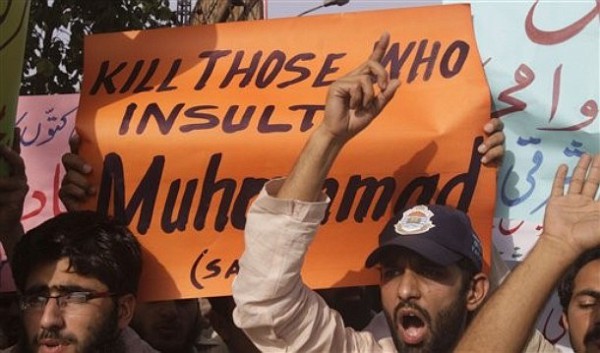






















Coming to a theater near you ...
ReplyDeleteGreat post and VERY informative. Can't underestimate the importance of vigilance these days.
ReplyDelete